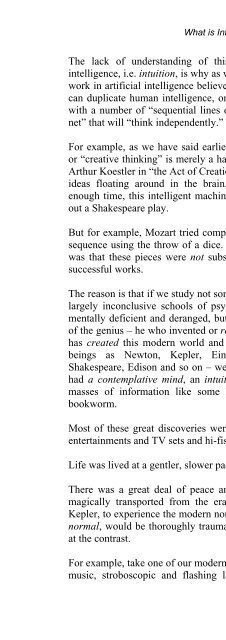07.+What+is+Intelligence+(February+2006) - Get a Free Blog
07.+What+is+Intelligence+(February+2006) - Get a Free Blog
07.+What+is+Intelligence+(February+2006) - Get a Free Blog
You also want an ePaper? Increase the reach of your titles
YUMPU automatically turns print PDFs into web optimized ePapers that Google loves.
What is Intelligence? 53<br />
The lack of understanding of this “holistic” nature of real human<br />
intelligence, i.e. intuition, is why as we have said, that many of those who<br />
work in artificial intelligence believe it is just a matter of time before we<br />
can duplicate human intelligence, or that is, design a computer program<br />
with a number of “sequential lines of code” or even a so called “neural<br />
net” that will “think independently.”<br />
For example, as we have said earlier, they imagine intelligent discovery<br />
or “creative thinking” is merely a happy chance “bisociation” (coined by<br />
Arthur Koestler in “the Act of Creation”) of two here-to-fore unconnected<br />
ideas floating around in the brain, and equally therefore, that given<br />
enough time, this intelligent machine or “mechanical monkey” can type<br />
out a Shakespeare play.<br />
But for example, Mozart tried composing by arranging lines of music in<br />
sequence using the throw of a dice. All we need report on that exercise,<br />
was that these pieces were not subsequently found to be his famous or<br />
successful works.<br />
The reason is that if we study not some of the hundreds of conflicting and<br />
largely inconclusive schools of psychological thought, or focus on the<br />
mentally deficient and deranged, but rather instead look at the mentality<br />
of the genius – he who invented or realised the technology and so on that<br />
has created this modern world and its libraries and universities – such<br />
beings as Newton, Kepler, Einstein, Bach, Beethoven, Mozart,<br />
Shakespeare, Edison and so on – we find that these extraordinary beings<br />
had a contemplative mind, an intuitive mind, not one which gorges on<br />
masses of information like some kind of demented and hyperactive<br />
bookworm.<br />
Most of these great discoveries were also made before the age of mass<br />
entertainments and TV sets and hi-fis blaring in our ears.<br />
Life was lived at a gentler, slower pace.<br />
There was a great deal of peace and quiet, and anyone who could be<br />
magically transported from the era they lived in such as Newton or<br />
Kepler, to experience the modern non-stop lifestyle we insanely accept as<br />
normal, would be thoroughly traumatised and likely almost die of shock<br />
at the contrast.<br />
For example, take one of our modern nightclubs with its ear-splitting rock<br />
music, stroboscopic and flashing laser light display, and a pounding


